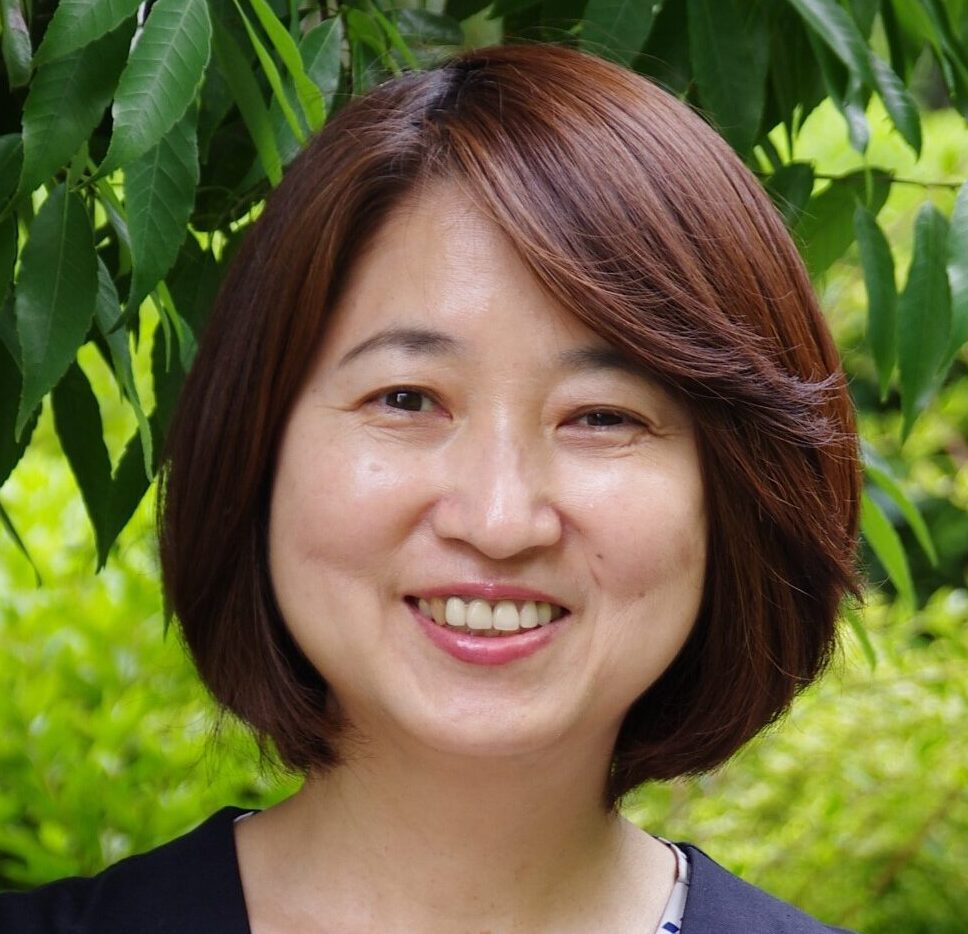Japan
- May 2021 Japan Report
- February 2021 Japan report
- July 2020 Japan report
- April 2020 Japan report
- Career Support for Immigrants in Japan, October 2018
- An Interview with Nika Ohashi, June 2018
- Updates on Career Development in Japan
- Japanese National Qualification System for Career Consultants – One Year Later
- November 2013 Japan Report
- Career Counseling/Advising in Japan
Recent climate
Some areas of Japan are experiencing the heaviest snowfall in years, causing traffic disruptions.
1.Macro Economy /Labor Market
Both the GDP growth rate and the unemployment rate are declining, and in my personal opinion, concerns about Japan’s economic situation are surfacing.
1.1 GDP growth rate
Quarterly GDP growth rate (Jul-Sep/2024)
Real GDP:0.3%, Nominal GDP:0.5%
https://www.esri.cao.go.jp/jp/sna/menu.html
1.2 Unemployment Rate
| Annual Average | Monthly (seasonally adjusted value) | |||||
| 2023 | 2024 | Sep. 2024 | Oct | Nov | Dec | |
| Rate | 2.6% | 2.5% | 2.4% | 2.5% | 2.5% | 2.4% |
https://www.stat.go.jp/data/roudou/sokuhou/tsuki/index.html
1.3 Information about new college graduates
As companies compete to acquire talent, they are increasing the starting salaries for university graduates. Some companies have already increased salaries by around 20%. There are concerns that this will decrease the motivation of existing employees.
Annual changes in starting salaries for university graduates
2.Activity of the APCDA Member
I introduced APCDA at some small study groups.
They were all concerned about the activities being conducted in English, but were interested in visiting various areas at the conference. They were especially excited about the conference being held in Australia or Malaysia next year.
3.Relationship (with JCDA: Japan Career Development Association)
3.1 Sugoroku Awards: https://www.j-cda.jp/notice/10116.php
JCDA is planning to hold an awards ceremony for use cases and projects related to “Life Sugoroku: Golden Thread” in March.
It is a tool to support self-understanding using Sugoroku. In the past, several Japanese people have introduced it at the APCDA Conference. It’s a shame that there is no English version, but it might be good for Momoko, me, and others to try it out as an interpreter at the in-person APCDA Conference from next year onwards.
3.2 The third “Career Dock” program
https://www.j-cda.jp/careerdock/
I don’t know if this exists outside of Japan, but Japanese companies require their employees to undergo a medical checkup once a year. A slightly more detailed examination is called a “Ningen (Human) Dock”.
It seems that this is being used literally to mean regular carrier checkups.
More details may be available at the next meeting or later.
“Ningen(Human) Dock” is a Japanese-English word, and “dock” comes from the English word “dock,” which means a facility for repairing and inspecting ships.
Political Movement
The previous prime minister dissolved the House of Representatives and a general election was held.
The ruling party, which had a single majority of seats in the Diet, has fallen short of a majority in the coalition, let alone a single majority. A new prime minister is scheduled to be decided at the Diet session on November 11.
I will be watching closely to see how this affects our career assistance.
Macro Economy /Labor Market
1 GDP growth rate
Quarterly GDP growth rate (Apr-Jun/2024)
Real GDP:0.7%, Nominal GDP:1.8%
2 Unemployment Rate
Unemployment rate was flat (Current as of Oct 1st, 2024)

< https://www.stat.go.jp/data/roudou/sokuhou/tsuki/index.html >
3 Employment offer rate for university students (scheduled to graduate in March 2025)
95.9% (As of Oct 1st, 2024)
<https://www3.nhk.or.jp/news/special/news_seminar/syukatsu/syukatsu1222/>

Recent climate
With temperatures approaching 40 degrees every day, it has become extremely hot, and there seems to be an increase in emergency transports due to heatstroke and dehydration.
In addition, there are days when sudden and localized thunderstorms begin in the afternoon and evening.
It feels like we are getting closer to a tropical rainforest climate, and it is becoming harder to feel the four seasons that were once characteristic of Japan.
Electricity consumption is rising due to the use of air conditioning, but the power supply is very stable, and this is putting a strain on the electricity rates of individual households.
Macro Economy /Labor Market
GDP growth rate continues to decline in Japan.
Quarterly GDP growth rate (2024.Jan-Mar)
Real GDP:-0.7%, Nominal GDP:-0.2%
< https://www.esri.cao.go.jp/jp/sna/menu.html >
1.2 Unemployment Rate
Unemployment rate was flat (Current as of July 30th)

Employment offer rate for university students (scheduled to graduate in March 2025)
88.0% (As of July 1st, 2024)
< https://shushokumirai.recruit.co.jp/research_article/20240513001/ >
Please note that final exams for flight attendants at major airlines such as JAL and ANA, as well as for civil servants, are scheduled after July and are not included in this statistic.
Companies are eager to hire, making it a seller’s market for students.
On the other hand, the employment situation for foreign students coming to Japan does not seem to be good.
42.6% (Graduated in March 2024.)
<https://saponet.mynavi.jp/column/detail/20240222153716.html>
Relationship (with JCDA: Japan Career Development Association)
JCDA held its annual general meeting in June.
The meeting only discussed agenda items, and no research presentations were made.
The meeting was entirely in Japanese, and translating it into English would be a heavy burden, so I won’t go into the details here.
1/ Macro Economy /Labor Market
1.1 GDP growth rate.
Quarterly GDP growth rate Preliminary figures (2023.Oct-Nov)
Real GDP:0.1.%,
Nominal GDP:0.5%
https://www.esri.cao.go.jp/jp/sna/menu.html
1.2 Unemployment Rate
Unemployment rate was flat
|
Annual Average |
Monthly (seasonally adjusted value) |
|||||
|
2022 |
2023 |
Dec.2023 |
Jan.2024 |
Feb |
Mar |
|
|
Rate |
2.6% |
2.6% |
2.5% |
2.4% |
2.5% |
2.6% |
https://www.stat.go.jp/data/roudou/sokuhou/tsuki/index.html
3/ Employment offer status for university students
The Ministry of Health, Labor and Welfare (MHLW) and the Ministry of Education, Culture, Sports, Science and Technology (MEXT) jointly conducted a survey on the status of job offers for university graduates scheduled to graduate in March 2024, and compiled and released the results as of February 1, 2024. (2024.3.15)
The employment offer rate for university students increased by 0.7 percentage points year-on-year to 91.6%, rising for the third consecutive year and recovering to the pre-Corona disaster level.
1.Macro Economy /Labor Market
1.1 GDP growth rate continues to decline in Japan.
Quarterly GDP growth rate (2023.Jul-Sep)
Real GDP:-0.7%, Nominal GDP:-0%
https://www.esri.cao.go.jp/jp/sna/menu.html
1.2 Unemployment Rate
Unemployment rate was flat

2.Activity of the APCDA Member
We held two APCDA Japan member liaison meetings In January.
APCDA members and several people who had worked overseas and were interested in APCDA attended. Non-members were invited by Mr. Iida.
Under (Past President) Momoko’s moderation, she introduced APCDA’s activities, members answered questions from non-members, and a lively discussion ensued.
3.Relationship (with JCDA: Japan Career Development Association)
JCDA sent an e-mail to approximately 20,000 of its members with information about the APCDA Conference.
Compared to previous years, only a few responses were received.
The number of Japanese people traveling overseas has not returned to the pre-coronavirus 2019 level.
I feel that there is a possibility that people have temporarily lost interest in overseas travel, partly due to the weak yen.
https://www.tourism.jp/tourism-database/stats/outbound/
July 2023 Report
The Legal Revision that could bring about changes in the Japanese labor market last April.
There has been a change in the law that allows employers to pay wages to employees in digital currency.
In principle, wages are paid in currency (Article 24 of the Labor Standards Law). However, as an exception to this rule, payment of wages to (1) bank accounts and (2) general securities accounts is permitted if the worker agrees (Article 7-2 of the Enforcement Regulations of the Labor Standards Law).
Employees now have more options to receive digital currency in addition to the above options.
However, I could not find any data on how many companies or employees actually choose this option.
How about in your area?
https://www.mhlw.go.jp/content/11200000/001082146.pdfTranslated at the author’s own risk from materials published by the Ministry of Health, Labour and Welfare
April 2023 Report
April is one of the busiest months of the year for both companies and schools (including universities, of course), as it is the start of the academic year in Japan.
Figure 1 (Translated by the author based on source information) shows the general schedule of job hunting and recruitment activities (for those scheduled to graduate/complete in 2023). This is also the busiest period for job hunting for students graduating in March 2024.
Public Relations Activities (Related to employment activities)
|
Start of Recruiting Selection Activities
- On or After June 1st of the fiscal year of graduation/completion
Advance Notice of Employment
- On or After October 1st of the fiscal year of graduation/completion
In March, each company begins holding company information sessions, after which students are required to register for entry to the company site of their choice.
It may be said that the selection called entry has begun in preparation for the lifting of the ban on interview activities in June.
In addition, recently, there are activities that companies approach, and some students use agents, and job hunting activities are beginning to diversify.
In any case, it is the students who are the hardest work, and career counselors are in the midst of supporting students at each university.
May 2022 Report
1. Labor market
1.1 unemployment ratio
1.2 Job search for school graduates
2. Activity for APCDA
It seems that the number of applicants for the next APCDA Conference has exceeded 20.
It appears that the e-mailed guidance to approximately 20,000 members in February with the cooperation of JCDA was effective.
Thanks again for the message from the APCDA executive members.
August 2021 Report
Due to the regional state of emergency and the duration of the Tokyo Olympic 2020, there were few major moves.
We will report on the activities of the members and the movements of JCDA.
1. APCDA Virtual Conference
- Many Japanese members said that it was a wonderful conference.
- Thank you again to all APCDA members.
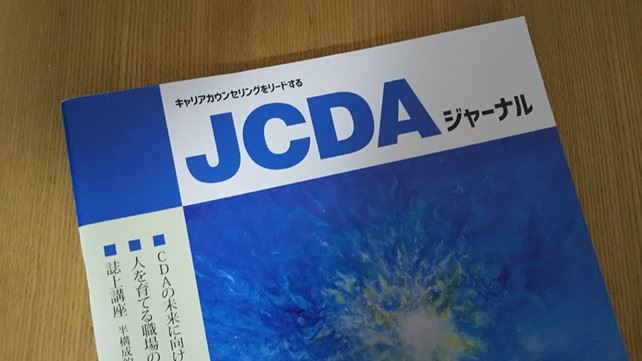

- The number of participants in the conference has been increasing year by year.
- -Approximately 40 participants were from Japan, 3 groups of presentations, and multiple contest winners-
- 2. I contributed the APCDA Conference report to the JCDA journal with the collaboration of some other members.
I am sorry that I could not share the contents to you because it was only in Japanese and only in paper books. (See 2 photos).
3. JCDA announced that it will hold a “20,000 people commemorative conference” in October.

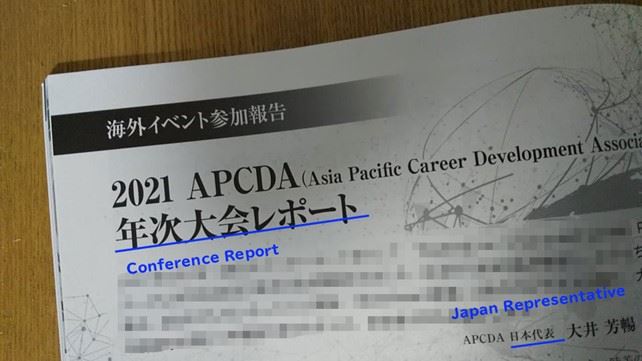
May 2021 Japan Report
March is the graduation season, and April is the entrance and hiring season in Japan.
Spring is one of the busiest seasons for career counsellors.
Although it is shrinking in scale, hiring season has begun to resume its usual activities.
APCDA Japanese Members Activities
- The great thing is that Japan has 26 APCDA members, an increase of 7 members from the previous Country/Aria Council Meeting.
- We sent an APCDA conference introduction mail for all JCDA members (18-Mar-2021). I believe 15 people completed registration after the email.
- We held an APCDA Japanese Members Meeting with over 10 members in this week. We thought about attending the Virtual Conference (4-May-2021).

JCDA (Japan Career Development Associate)
- JCDA has completed all training in last fiscal year with online.
- And then it plans to continue online training in 2021.
- JCDA was announced that the number of JCDA members has exceeded 20,000. And it seems that a commemorative tournament will be held in October.
February 2021 Japan report
1. Macro environment in Japan
The Japanese economy had a temporary rise last year, and the COVID-19 infection situation seems to be declining after peaking in early January. So, it seems that the future economy can be expected, but economic activity is disjointed and the situation will continue to be difficult.
- Real GDP quarterly growth rate (Jul-Sep) +5.3%
- Job openings-to-applicants ratio was flat (1.08(Jul/2020) -> 1.06(Nov/2020))
- The unemployment rate has risen. (2.4(Sep/2020) -> 2.9(Dec/2020))
- The state of emergency is limited to 10 prefectures (including Tokyo) and continues until early March. However, unlike lockdown, it is not legally binding.
- The government is instructing schools to resume face-to-face lessons without asking them to close.
- The new graduate recruitment activity cycle of companies is lagging and reluctant.
- We pay tribute to all professionals, especially healthcare professionals.
2. Introduction activities of APCDA in Japan
- We held the APCDA Japan Meeting with 14 participation (7 member & 7 non-member) (Nov 23)
- Special thanks to Marilyn and Gulnur for your message to the Japanese members. (I attached a snap of the day)
- We will continue to promote awareness-raising activities regarding APCDA in Japan.
3. Status of JCDA (As a Japanese mainstream organization for career counselling)
- JCDA continues to provide brush-up training for career counsellors by Zoom.
- JCDA’s English site has been updated:
July 2020 Country report
- The situation in Japan affected by COVID-19 (Macro economy)
- Real GDP(Jan-Mar) QoQ Ration -3.4%
- Jobs-to-Applicants Ratio (1.49(Jun/2020) -> 1.20(May/2020))
- Unemployment Ratio(2.4(Jun/2020) -> 2.9(May/2020))
- School restarts vary (Gradually bring all or some classes online)Summer vacation will be shortened
- The hiring activity cycle seems to be turning as usual, although there is a delay
- Resume professional sports (Baseball: 19th Jun, Soccer/Football: 27th Jun, Sumo wrestling: 19th Jul )
- The start of the Tokyo Olympic has been postponed for one year (it has not yet been decided to cancel)
- Matters contributed to APCDA by Japan Member since the last committee
- APCDA Japan Meeting held Participation of 11 people (4 member & 7 non-member) (4th May). As a result, 2 new members are acquired
- Participation of 5 members in Region meeting (9th Jun)
- 5 articles in News Trend by 4 people Posted for “Career Trends”. (mid-May to mid-Jul)
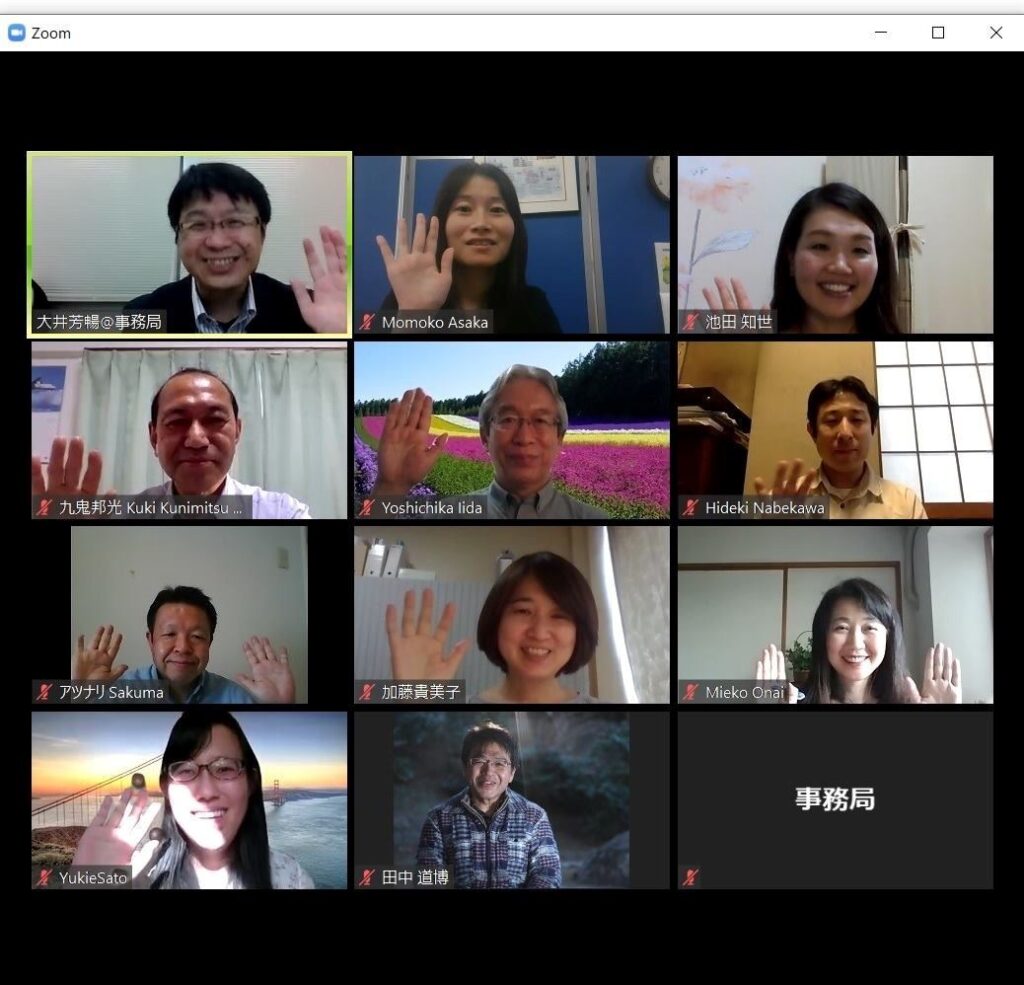

- https://apcda.wildapricot.org/Career-Trends#Ooi2 by Yoshinobu Ooi (me)
Status of JCDA (Japan Career Development Association) with COVID-19
- JCDA suspended all training from March to May. Since then, it has been held at Zoom since June.
- JCDA decided not to conduct face-to-face training, but only Zoom until September.
- JCDA is also considering holding it at Zoom after October.
- Although many career counselors are unfamiliar with Zoom, they are gradually beginning to acquire technology through test connections and the like.
- Japanese career counselors feel the need to adapt to new technologies and are beginning to implement them.
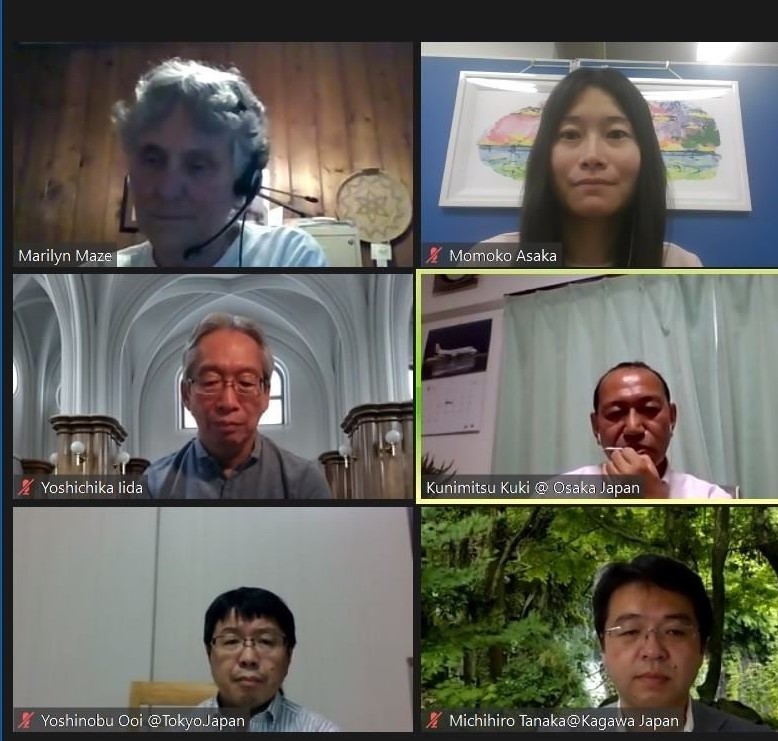
- https://apcda.wildapricot.org/Career-Trends#Ooiby Yoshinobu Ooi (me)
- https://apcda.wildapricot.org/Career-Trends#Kuki by Kunimitsu Kuki
- https://apcda.wildapricot.org/Career-Trends#Ikeda by Kazuyo Ikeda
- https://apcda.wildapricot.org/Career-Trends#AsakaCOVID by Momoko Asaka
April 2020 Country report
With the succession of the country director in Japan, we worked on distributing APCDA information to Japanese career counselors with Secretary Momoko Asaka.
- APCDA Report and Experience Sharing Meeting Held December 8th, 2019
- Aiming to increase conference participants
- What is APCDA?
- What is going on at the APCDA Conference?
- Experience story of the member who experienced the presentation
- Q & A and discussion by participants
2020 Virtual Conference
- There were 7 participants from Japan. (4 members and 3 non-members)
My first report as the APCDA Japan Representative
I took over the country representative last October. During the past six months, we have focused on introducing APCDA to career counselors in Japan, triggered by the replacement of country directors. The aim is to increase the number of participants from Japan to the annual conference.
- Publicize APCDA activities (fb & Web Site ) (Japanese Only) JCDA fB pag) https://www.facebook.com/JCDA.Page//,
- We have restarted the APCDA-Japan’s fb page (Japanese Only)https://www.facebook.com/APCDA.Japan/,
We did three things.
- We held an APCDA briefing, although the rally format and some participants used zoom. We introduced what APCDA is, past conferences and so on to more than 10 participants.
- We have restarted the APCDA Japan facebook page. The Facebook page appeared to have been created during the APCDA Japan Conference (2015), but has not been maintained since. We send information little by little since last year. Currently It has 75 “Like!”s. We believe this number will be one of the KPI. I’m sorry, but sentences are only in Japanese.
- With the JCDA and Japan’s most famous career development company, “Nippon Manpower”, we shared articles on our experiences on the JCDA facebook page, on the Manpower website and in our email magazine. Unfortunately, this is also in Japanese only.
When we received questions from report participants and article readers, we realized that it was necessary to introduce APCDA more to career counselors in Japan.
Finally, Seven people from Japan participated in the 2020 Annual Conference.
The participation of three non-members felt the future potential.
If you have any question, please send me email.
Career Support for Immigrants in Japan
by Nika Ohashi
 “Career Service for Everyone!”
Global collaboration is a key to support successful career dreams for everyone.
International Organization of Migration (IOM) defines a migrant as any person who is moving or has moved across an international border or within a State away from his/her habitual place of residence, regardless of
(1) the person’s legal status;
(2) whether the movement is voluntary or involuntary;
(3) what the causes for the movement are; or
(4) what the length of the stay is.ort.
“Career Service for Everyone!”
Global collaboration is a key to support successful career dreams for everyone.
International Organization of Migration (IOM) defines a migrant as any person who is moving or has moved across an international border or within a State away from his/her habitual place of residence, regardless of
(1) the person’s legal status;
(2) whether the movement is voluntary or involuntary;
(3) what the causes for the movement are; or
(4) what the length of the stay is.ort. 1. Facts in Japan
Japan has faced low birth and a high aging rate which resulted in a serious population decrease and low labor productivity. The birth fertility rate in 2017 was 1.42%. The average life span for males is 80.98 and females is 87.14 years old. The population in 2065 is predicted to be 88,080,000 and the population of productive aged individuals (15 to 64 years of age) would be 45,290,000.
Current Japanese economy is described as deflation and saving money is one of the most common interests among citizens. Even in this kind of economic environment, data classifies the economy as booming due to the August 2018 effective job openings ratio as 2.25 and unemployment rate of 2.4%. Finding or changing jobs is easy. However, many corporations are experiencing hiring difficulties. Last year, 28,142 went out of business and 317 bankrupted due to issues related to lack of personnel. To solve these labor-related matters, the Japanese government has decided to accept more workers from abroad, as well as to promote additional action plans for young people, women and the elderly, and to develop AI and other technologies.
Public policies, such as “The Japan Plan for Dynamic Engagement for All Citizens” and “Work Style Reforms,” increased the 1,278,670 foreign workers in 2017 up 18.0% and allowed international students to work up to 28 hours a week with permission. Additionally, the Japanese government has a plan to increase the number of students to 300,000 and encourage a 50% increase in employment following graduation. The Organization for Economic Cooperation and Development (OECD) report, released in 2015, also shows government solutions are working. The number of inflows to Japan has increased by approximately 55,000 from the previous year to approximately 390,000; slotting Japan in 4th place among 35 other countries who are increasing foreign workers.
However, another report, “Attractiveness of Working Country,” slots Japan in 52nd place out of 61 countries researched. Additionally, the Migration Integration Policy Index (MIPEX) slots Japan in 27th place out of 38 countries. One of MIPEX’s evaluation categories, “Labor Market,” showed that Japan lacked a comprehensive policy for immigrants to participate in vocational training and prevent unemployment. Another, the MIPEX “Education” category, showed insufficiency of policy for parents of immigrants.
Japan’s rapid “Multicultural Society” increase is clearly experiencing the growing pains of irregular employment, economic and social disparity and poverty. Further research and study of the inflow of foreign workers is required. Japanese career consultants also need to enhance their knowledge of serving this exploding population.
2. Career Services for Immigrants
Currently, Japanese public sector support for individuals and corporations before and after the hiring of foreign workers includes about 544 “Hello Work” centers spread in local areas and about 4 “Employment Service for Foreigners” centers in bigger cities.
Support from these centers includes personal career consulting, job search, and variety of technical training courses. Even though the services are available to youth through seniors, many immigrants lack knowledge of them and/or are unable to access them easily. Furthermore, center service providers lack the specialized knowledge required to serve the diverse needs of foreign workers.With the recent increase of social issues such as irregular employment, economic and social disparity, and poverty, the Japanese government has discussed “career upgrading” and “career change.” It is important to re-establish appropriate career education curriculum and services for all people, including immigrants. Life is thought to be 100 years or more, and we all need to acquire necessary knowledge and skills from an early age.
3. Primary Research: Life and Work of Foreign Workers
A questionnaire form (44 questions in Japanese) survey instrument, originally used in 1994’s “Life and Opinion,” concerning life and work environment by International Volunteer PolePole, was administered to subjects generated with support from current members of PolePole’s Japanese School and Ohashi’s personal contacts. After an explanation of the survey instrument’s purpose and method, the subjects completed the questionnaire form and turned it in for collection on site. This survey was established as a preliminary survey for the next year. Effective response was received from eleven (11) subjects. Seven (7) were males and four (4) were females. Their average age was 26. Their length of stay in Japan varied widely, from less than 3 months to more than 37 months. Their most common Visa status was “Technical Intern Training Program.”
Despite subjects reporting high motivatition to learn Japanese, they consistently reported almost no opportunities to communicate with Japanese, whether inside the workplace or outside in the community at large. More than half answered they have problems and troubles in their life and work place. One subject, a third generation Japanese from Brazil, showed different characteristics. For example, his high Japanese language skill was developed across his longer stay in Japan. He also held a different type of Visa. Plans for future use of the survey instrument are in the works including improvements to the questionnaire form as well as in the method of use. Further collaboration with public sectors, corporations and other organizations also is planned.
4. Future for Career Consultants
Japan’s Ministry of Health, Labor and Welfare has set a goal to increase the number of Certified Career Consultants, Japanese national license, from 37,000 to 100,000 by 2024. Last June, Prime Minister of Japan and his Cabinet have decided to create new qualifications in five areas of particularly serious labor shortage in order to accept 500,000 more by 2025, and under Economic Partnership Agreement (EPA). Nurses and elderly care workers from Indonesia, Philippines, and Vietnam will be tapped to further increase the numbers. As career consultants, we need to prepare for the future with long and wider perspectives: 1. Additional research and case studies are needed and should be shared continuously in global settings. 2. Seamless career education and service should be established by Certified Career Consultants and governmental offices. 3. Collaboration with career support professionals around the globe should be continued and fostered through availability of professional development dollars.
Author’s Note: The grass-roots movement for empowerment and advocacy for immigrants and minorities takes time. We all need to cooperate by moving one step further. The sustainable development of the world is at stake!
An Interview with Nika Ohashi
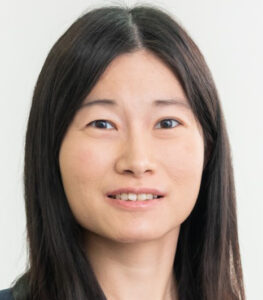 Nika Ohashi, a Certified Career Consultant (Japanese national license), was recently interviewed by Kanako Hori for the JCDA (Japan Career Development Association) Journal and her interview will be published in volume 65 of the JCDA Journal:
As a young girl, Ms Ohashi’s father died suddenly and she was grateful for the support of others. She decided to pursue a degree in psychology and completed a bachelor’s degree in Psychology in the US. When she returned to Japan, she worked a variety of jobs in the public sector and private national and foreign sectors. After taking time out to have a family, she has increasingly focused on working with immigrants who are trying to adjust to her country and is now a member of a steering committee for a group that helps immigrants learn Japanese. Ms Ohashi said, “As a member of the steering committee of a volunteer organization, I investigated the life and work of workers from overseas with the perspective of a career consultant.”
She attended the APCDA Conferences in Taiwan in 2016 and Manila in 2017 and was excited by making international contacts. Ms Ohashi said, “I should mention that APCDA is like a treasure box. It is very attractive and offers so many possibilities for both professional and personal development…. The ADB tour was like an awakening. When I told a friend of mine that ‘I might want to be a social entrepreneur,’ she replied, ‘I knew you were going to say that!'”
Ms Ohashi sees her life related to Dr. Krumboltz’s Happenstance Learning Theory. “I think like Dr. Krumboltz’s Happenstance Learning Theory, it is important to convert natural events to your energy. Even though there are struggles and surprises every day, I believe that I am on the right track.” She would like to set up a special interest group in JCDA for people interested in supporting foreign workers and international students.
She is grateful for her husband’s advice, “It is O.K to be different. Being different is something to be proud of.” Her favorite quote is, “Others will start to shine when you live your life with altruism.”
Nika Ohashi, a Certified Career Consultant (Japanese national license), was recently interviewed by Kanako Hori for the JCDA (Japan Career Development Association) Journal and her interview will be published in volume 65 of the JCDA Journal:
As a young girl, Ms Ohashi’s father died suddenly and she was grateful for the support of others. She decided to pursue a degree in psychology and completed a bachelor’s degree in Psychology in the US. When she returned to Japan, she worked a variety of jobs in the public sector and private national and foreign sectors. After taking time out to have a family, she has increasingly focused on working with immigrants who are trying to adjust to her country and is now a member of a steering committee for a group that helps immigrants learn Japanese. Ms Ohashi said, “As a member of the steering committee of a volunteer organization, I investigated the life and work of workers from overseas with the perspective of a career consultant.”
She attended the APCDA Conferences in Taiwan in 2016 and Manila in 2017 and was excited by making international contacts. Ms Ohashi said, “I should mention that APCDA is like a treasure box. It is very attractive and offers so many possibilities for both professional and personal development…. The ADB tour was like an awakening. When I told a friend of mine that ‘I might want to be a social entrepreneur,’ she replied, ‘I knew you were going to say that!'”
Ms Ohashi sees her life related to Dr. Krumboltz’s Happenstance Learning Theory. “I think like Dr. Krumboltz’s Happenstance Learning Theory, it is important to convert natural events to your energy. Even though there are struggles and surprises every day, I believe that I am on the right track.” She would like to set up a special interest group in JCDA for people interested in supporting foreign workers and international students.
She is grateful for her husband’s advice, “It is O.K to be different. Being different is something to be proud of.” Her favorite quote is, “Others will start to shine when you live your life with altruism.” Updates on Career Development in Japan
by Agnes Banyasz
Sharing Government Level News
By Momoko Asaka

- Self-career Dock SystemIn 2016, the Self-career Dock System was introduced just before the state examination system for career consultants and has shown rapid development. The Self-career Dock System is an organization that supports the awareness of career development by providing opportunities to regularly receive career consulting across the stages of life development, years of experience, and various types of work. Until 2016, career help and consultation in Japan only focused on people looking for a job or job-changing. It had been widely conducted by “Hello Work” (public employment security office) or HR companies. More recently, the Japanese government has been promoting the policy for supporting career consultants with special knowledge.
Japanese National Qualification System for Career Consultants – One Year Later
by Momoko Asaka
 Background of Japan’s national qualification system
In Japan, it has long been considered common to work for the same company from graduation until retirement. However, nowadays as people’s values are diversifying, we are entering a new era in which more people want to realize their own way of working and lifestyle. Along with rapid changes in society, the demand for career services is increasing.
Given this background, the “100,000 Career Consultants Training Plan” aims to double the current number of career consultants (approximately 50,000) by the end of March 2025. In April 2016, a new national qualification for career counselors was created. Since the new system requires that career counselors renew their license every five years, improvement and standardization among qualified personnel is expected.
Background of Japan’s national qualification system
In Japan, it has long been considered common to work for the same company from graduation until retirement. However, nowadays as people’s values are diversifying, we are entering a new era in which more people want to realize their own way of working and lifestyle. Along with rapid changes in society, the demand for career services is increasing.
Given this background, the “100,000 Career Consultants Training Plan” aims to double the current number of career consultants (approximately 50,000) by the end of March 2025. In April 2016, a new national qualification for career counselors was created. Since the new system requires that career counselors renew their license every five years, improvement and standardization among qualified personnel is expected. Improvement of work environment
Under the “Vocational Ability Development Promotion Law”, the task of employers is to “secure opportunities for career consultation and other assistance as necessary” for their employees. Specifically, it will be required to make effective use of “a person with expert knowledge and skills related to career consultation” and “provide professional services for career consultation”.
From the workers’ perspective,
Demand for Human Resources development and training poses a challenge
Many Japanese career consultants and counselors belong to public employment security offices, University employment support departments, and private employment support organizations. Many consultations are related to human resources matching. The percentage of companies involved in human resource development and training is about 20%. With 100,000 people planned, increasing demands for human resources development and career development will become a challenge.
Japan's National Career Adviser Certification
by Marilyn Maze
 At the APCDA Conference, Mr. Ryoji Tatsuno, President of the Japan Career Development Association, announced that the Japanese government has decided to implement a national level certification process for Career Development Advisors in order to assure quality and clarify this new and growing field. This is a dramatic and important move in Asia. Few other countries, including the US, have a national level certification requirement for career development advisors.
At the APCDA Conference, Mr. Ryoji Tatsuno, President of the Japan Career Development Association, announced that the Japanese government has decided to implement a national level certification process for Career Development Advisors in order to assure quality and clarify this new and growing field. This is a dramatic and important move in Asia. Few other countries, including the US, have a national level certification requirement for career development advisors.
Currently, about 40,000 people hold certification from one of the 10 approved providers. For information about the variety of training programs in Japan, please click here to read a web article which was translated to English by Dr. Akira Otani. Notice that Career Counselor, Employment Counselor, and Career Development Advisor are names that are used interchangeably in Japan. For even more detail on these training programs, click here to see a list of the training providers and their requirements.
Of these certified career development advisors, 14,000 were trained by Nippon Manpower, the largest Japanese provider of this training. A group of conference attendees toured the Nippon Manpower facilities, hosted by manager Michi Mizuno. Nippon Manpower was founded in 1967 to provide training to business professionals, recruitment and outplacement services, and government policy implementation.
Ms Mizuno explained that, in the 1990’s, unemployment in Japan began a steady rise, peaking in 2003, at over 5%. The Japanese society is aging. Many older workers have held a variety of occupations over their lifespans. Globalization has caused high labor costs in Japan to be questioned and large numbers of workers have been forced to shift from manufacturing to the service sector. These changes have caused growing awareness that workers need assistance clarifying their career opportunities and transitioning to new fields. Currently, 25% of the population is over 65, and the working-age population is declining, adding more stress to the labor market.
In 2000, Mr. Tatsuno initiated the Japan Career Development Association. JoAnn Harris Bowlsbey, then President of NCDA, was asked to help Nippon Manpower develop a Career Development Advisor curriculum. Career development advisors currently help young workers find a place in the labor market and senior workers look for meaning in retirement or second careers. They provide services related to coping strategies, motivation and satisfaction, work-life balance, and diversity. Career Development Advisor training takes place over a 3 to 4 month time period and requires 140 hours of coursework. An examination is required for certification. The certification must be renewed every five years and continuing education is required for recertification. While a small number of graduates work in schools (K-12), most work in outplacement, university career centers, public agencies, and human resource departments of private companies.
At the APCDA Conference, Dr. Agnes Watanabe urged that Japan review is reliance on Career Development Advisors, who may have no training in counseling. The dearth of counselor education programs preparing master’s level career counselors allows the lines to become blurred between advising and counseling.
November 2013 Japan Country Report
by Yoshiji Ishikawa
Labor Market Trends- As a result of the pension eligibility age being raised, the government has mandated that every employee can work until age 65. This law ensures that many employees will work about 40 years for the same company because there is lifetime employment in Japan. Career counselors or advisors are needed support employees who want to build their career autonomously and not be dependent on the company. Many employees who graduated from college or university are employed as candidates for executive positions in Japanese companies. They may have experienced some personal relocation and job rotation and may be promoted to the level of manager or executive. They need to be supported at 20’s or 30’s or 40’s to develop their careers without depending on their employer. In addition, many middle managers have to quit their positions when in their mid 50’s to make space for the younger generation. It is feared that the worker’s motivation will decline and it is difficult for people in their 50’s to change their career to another company. Employees of this age are faced with proving that they are still valuable to their employer. Career counselors are needed to assist employees at this stage of their careers.
- The rate of working women between 25 and 39 years old has decreased from 70% to 66% this year. This decline is a result of the aging of the population and the lack of government support for women in the workforce. The government is now considering measures to support working women by raising the wage compensation during childcare holidays,
- As a result of the economic recovery trend, the employment rate of new graduates has improved. However, the non-employment rate after graduation still is 15.4%. Many students still think the best opportunities are with larger companies. As a result, employment with small and medium-sized enterprises is quite low. There is still lifetime employment in Japan and many companies hire new recruits after graduation immediately in April. If students are not employed after graduation, it is difficult for them to be hired as a regular employment. Many students believe that a large company will provide more prestige than a small company. There is a need to educate students so that they will embrace the need to change their awareness to pursue their career by themselves. All universities have career education but they tend to treat career education and vocational education as the same. Career counselors and advisors need to show the students the distinction between career support and vocational support.
Career Counseling/Advising in Japan
by Yoshiji Ishikawa
 As a result of the pension eligibility age being raised, the government has mandated that every employee can work until age 65. This law ensures that many employees will work about 40 years for the same company because there is lifetime employment in Japan. Career counselors or advisors are needed support employees who want to build their career autonomously not dependent on the company.
Many employees who graduated from college or university are employed as the stem candidates in Japanese companies. They may have experienced some personal relocation and job rotation and could be promoted to manager and executive. They need to be supported at 20’s or 30’s or 40’s to develop their career without depending on their employer.
In addition, there is the now the opportunity to retire around mid 50’s. It is feared that the worker’s motivation will decline. It is difficult for people in their 50’s to change their career to another company. The employees of this age are concerned about ways to prove they are still valuable to their employer. Career counselors are needed to assist these employees at this stage of their careers.The rate of working women between 25 and 39 years old has decreased from 70% to 66% this year. This decline is a result of the population that is aging and the lack of government support of women in the workforce. The government is now considering measures to support working women by raising the wage
As a result of the pension eligibility age being raised, the government has mandated that every employee can work until age 65. This law ensures that many employees will work about 40 years for the same company because there is lifetime employment in Japan. Career counselors or advisors are needed support employees who want to build their career autonomously not dependent on the company.
Many employees who graduated from college or university are employed as the stem candidates in Japanese companies. They may have experienced some personal relocation and job rotation and could be promoted to manager and executive. They need to be supported at 20’s or 30’s or 40’s to develop their career without depending on their employer.
In addition, there is the now the opportunity to retire around mid 50’s. It is feared that the worker’s motivation will decline. It is difficult for people in their 50’s to change their career to another company. The employees of this age are concerned about ways to prove they are still valuable to their employer. Career counselors are needed to assist these employees at this stage of their careers.The rate of working women between 25 and 39 years old has decreased from 70% to 66% this year. This decline is a result of the population that is aging and the lack of government support of women in the workforce. The government is now considering measures to support working women by raising the wage compensation during childcare holidays, extending the childcare holiday period and increasing the percentage of female managers. There is a lack of support for men to participate in raising a family. Very few employers offer childcare leave for men. Hopefully this will change. Career counselors and advisors should support work-life balance for male clients, not just female clients.
As a result of the economic recovery trend, the employment rate of new graduates has improved. However, the non-employment rate after graduation still is 15.4%. Many students still think the jobs are with larger companies. As a result, employment with small and medium-sized enterprises is quite low. There is still lifetime employment in Japan and many companies hire new recruits after graduation immediately in April. If students are not employed after graduation, it is difficult for them to be hired as a regular employee.
Many students think “If joining a large company, the company will provide good benefits to me.” There is a need to educate the students so that they will embrace the need to change their awareness to pursuing their career for themselves. All universities have career education but there is a tendency to treat career education and vocational education as being the same. Therefore, career counselors and advisors need to show the students the distinction between career support and vocational support.
There are private career development groups that provide some training programs for their members. At this time the Government has not initiated standard training programs for career counselors.
November 2021 Report
1. Macroeconomic statistics
The impact of covid-19 on the Japanese economy has been reflected in GDP trends and the unemployment rate.
The Japanese government lifted the emergency on September 28, so I hope that the economy and labor market will recover in the future.
1.1 GDP Transition
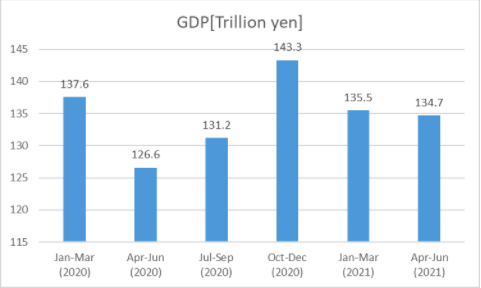
1.2 Unemployment Ratio Transition
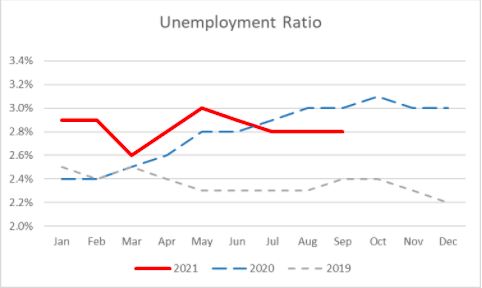
(Labor force survey, Oct, 29th 2021: Statistics Bureau, Ministry of Internal Affairs and Communications)
2. JCDA’s activity
JCDA (Japan Career Development Association) held a “20,000 people commemorative conference” last October.
The number of participants has exceeded 1,000.

